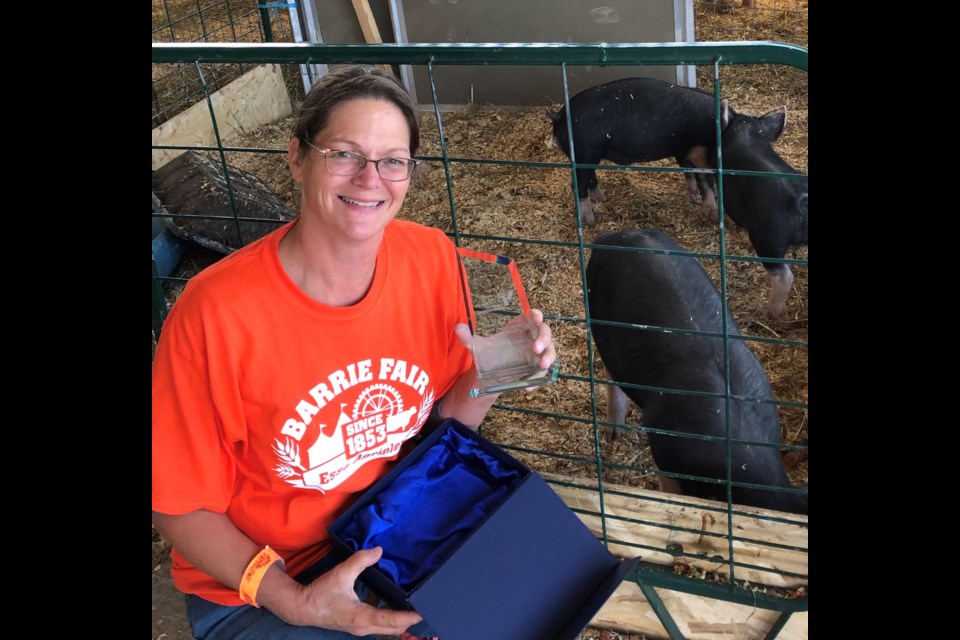From the age of six, free-range pig farmer Lisa Peterson has always been in the thick of feeding chickens, helping with the cattle and pretty much living on a horse.
Having grown up on a farm in central Minnesota, Peterson spent 13 years working in marketing and publishing in Vermont before circling back to become a small-scale pig farmer in Thornton, just south of Barrie.
“After buying my own farm in 2003, it only made sense to get back to doing those things to help feed my young family. And it was so rewarding, of course, I had to try feeding other families,” Peterson says of Stone Horse Farms.
She says she has lost track of how many customers don't enjoy eating standard pork or chicken, eggs, or milk.
“It is always exciting and gratifying to have new customers come back and say, 'Oh my gosh, this meat tastes amazing, and it doesn't make me sick',” Peterson adds.
Thanks to how she raises and feeds her pigs, she’s thankful that she has an option that works for them.
While farmers' markets are Peterson’s primary way of reaching customers, she says it can be a unique experience for them to visit her 140-year-old shed lined with freezers. And, occasionally, meeting her goat named 'Butthead' trying to break into the shed.
“When they visit the farm to pick up larger orders, they can see every part of what goes on here, from newborn piglets to the trailer ready to head off to the butcher. And, of course, Butthead," she says.
Peterson acknowledges that only a small portion of society believes in the farm-to-table approach to food, while the rest just want convenience and low cost.
“Certainly, I get that. Anytime there is another disruption in the supply chain, our local markets see a spike in business. But once the trucks are running and the factories are operating again, most go back to the supermarkets," she says.
With food inflation now through the roof, Peterson argues that local, high-end foods are actually in the same price range as mass-produced foods.
“Local food has historically been the less costly food, so it's ironic that it's come full circle this past year," she says.
For her, this is an opportunity for families to try a quality of food they might traditionally avoid on their food budget, and an even bigger opportunity for local farms who are able to offer their products.
Despite seeing a loyal group of new people who keep coming back thanks to the quality products they are getting, she's cautious about making predictions.
“Will that continue? I hope so. But there are so few small farmers selling direct to the public that there would have to be a reality shift to make it the norm," Peterson says.
Large-scale production and distribution, she says, is hugely efficient and makes it hard for small farms to compete against it.
“It has also wiped out many small- and mid-size farms that we'll never get back," she says.
Meanwhile, Peterson has been active in revitalizing and marketing local food in the region. When COVID-19 shut everything down in 2000, she teamed with other farmers to organize what became the Farm-to-Family, Local Fare Barrie event.
“I started making some calls to other farmers who sell direct, and we decided to try doing a drive-through farmers' market at Thorganic Farms in Thornton. We announced it on a Wednesday, and by Saturday, we had 30 orders, and then 90 in the next week," she says.
The team effort proved successful and within a month there were 200 cars lined up along the road coming into Thorganic to pick up food orders for themselves, their neighbours and their families.
“The event is still going strong and has been one positive side effect of COVID-19 for both local farms and families," Peterson says
Most recently, Peterson partnered with Fresh Food Weekly, a charity founded for families who need more food than they are able to get through area food banks.
“It took a few days of logistics, but we came up with a way to deliver 50 meal boxes to families in need that were paid for by people in our Farm-to-Family community, plus some generous local businesses," she says.
Peterson breeds, births and raises her free-range pigs from start to finish in order to maintain complete control of how they are cared for and what they eat. Her finished frozen meats are available for individual purchase from the farm freezers, as well as larger orders for a side of pork.
She hopes that consumers who enjoy the natural flavour and healthy nutrition of the meat from local animals will make it a practice to support small family farm stores.
“Staying connected with local farmers ensures their products will be there in both easy times and when the world has a crisis.”
